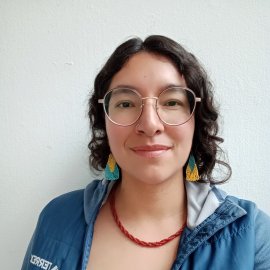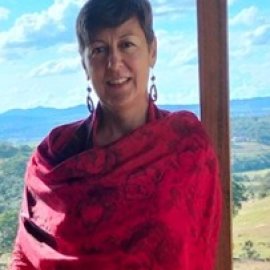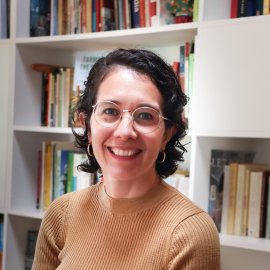
April 2026 to June 2026
Karla Nicol Hernández Puente was born in Xalapa, Veracruz, Mexico. She earned her bachelor’s degree in Biology from the Universidad Veracruzana, where she participated in a student exchange program in 2008 at the Faculty of Life and Earth Sciences at the University of Nantes. She went on to complete a master’s degree in Biotic Resources at the Universidad Autónoma de Querétaro (UAQ) and a PhD in Biological Sciences at the same institution. She also has complementary training in ethnographic methods for food studies, agroecology for sustainability, agroforestry, and community herbalism.
For the past twelve years, she has been a researcher and lecturer at UAQ’s Amealco engineering campus, where she focuses on the study of agroecosystems and plant agrobiodiversity within the region’s Indigenous biocultural landscape, emphasizing their potential for developing models of sustainability, health, and food sovereignty. She has participated in agroecology research and outreach projects as part of the State Sustainability Corridor at UAQ.
She is also part of a collective of women community documentarians working with a gender perspective to promote the Hñäñho language. She is currently writing a book on the diversity and non-timber uses of trees in Amealco and preparing a project to establish a community seed bank.
She lives with her family in the Indigenous community of San Miguel Tlaxcaltepec in Amealco, where she is a member of the Community Committee of the Corn and Milpa Fair, promoting seed and knowledge exchange in support of food sovereignty and health.
This collective project examines how food can be understood and managed as a commons — a shared resource that is collectively governed and goes beyond the constraints of private property or commodification.
Rooted in the values of solidarity, cooperation, and collective governance, the multidisciplinary team proposes to study how communities in Mexico and in certain regions of Europe organize their food systems in ways that integrate ecological sustainability, health, and livelihoods, while fostering interdependence and reciprocity.
By exploring the roles of education and gender in sustaining these practices, the project also looks at how responsibilities are distributed equitably within communities.
As part of this initiative, the project team will organize an international roundtable bringing together practitioners, organizations, and scholars to discuss the challenges and opportunities of scaling up commons-based food practices. This dialogue aims to address issues of governance, inclusivity, and the sustainability of food systems, while generating concrete pathways for applied research.
The ultimate goal is to launch an applied research project following the residency, focused on adapting and implementing proven models of food commons in diverse contexts. This forward-looking approach combines theoretical reflection with practical strategies, thereby contributing to the global debate on the commons as a foundation for more equitable and resilient systems.
Hernández-Puente KN, Hernández-Sandoval L, González-Santos R, Casas A, Martínez M, Steinmann VW. Diversity, management, and uses of edible plants in a Ñäñho community of Southern Querétaro, Mexico. J Ethnobiol Ethnomed. 2025 Mar 12;21(1):18. doi: 10.1186/s13002-025-00756-6. PMID: 40069813; PMCID: PMC11899470.
Hernández-Sandoval L, González-Santos R, Hernández-Puente KN. Catálogo de semilla nativa y naturalizada de tres comunidades indígenas de Amealco, Querétaro: Volúmen I. Enero, 2025. Editorial de la Universidad Autónoma de Querétaro. https://play.google.com/store/books/details?id=dv_yEAAAQBAJ&pli=1
BARA, C. R., González-Santos, R., Colmenero Morales, S.L., Hernández-Sandoval, L., Hernández-Puente, K. N. Sistemas locales de producción y redes alimentarias alternativas en Amealco de Bonfil, Querétaro, México: Resistencias e interconexiones para caminar hacia la soberanía alimentaria. En: Debates en Sociología, N° 57, 2023, 244-272 pp., e-ISSN 2304-4584
González-Santos Rosalinda, Hernández-Sandoval Luis, Hernández-Puente Karla Nicol, Ortega-Paczka Rafael. Distribución y caracterización ecogeográfica de maíces nativos de Querétaro, México. Rev. fitotec. mex [revista en la Internet]. 2023 Dic [citado 2025 Mayo 12] ; 46( 4 ): 341-348. Disponible en: http://www.scielo.org.mx/scielo.php?script=sci_arttext&pid=S0187-738020…. Epub 09-Abr-2024. https://doi.org/10.35196/rfm.2023.4.341.
Sánchez, K. R. J., A. M. Luna, A. A. F. Pérez, J. F. G. Trejo, J. L. C. Servín, R. H. Maldonado, K. N. H. Puente, and C. A. M. Cardenas. “Effect of Nutrient Solution Concentration on Phenology, Stevioside Content, Total Phenolic Compounds and Total Flavonoids in Leaves of Stevia Rebaudiana Bertoni”. Emirates Journal of Food and Agriculture, vol. 33, no. 3, Apr. 2021, pp. 237-44, doi:10.9755/ejfa.2021.v33.i3.2666.


